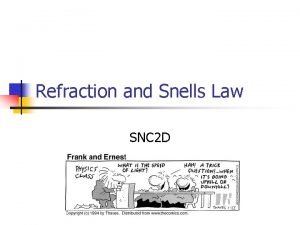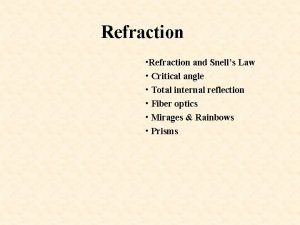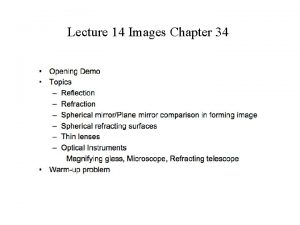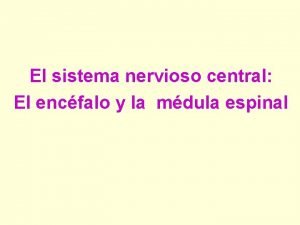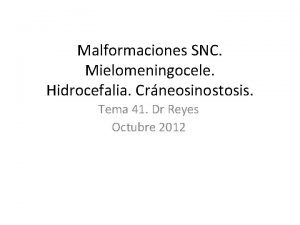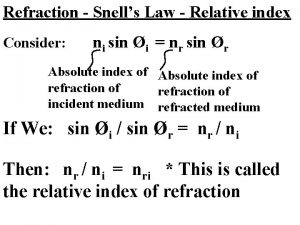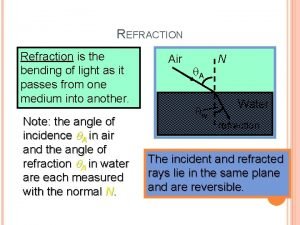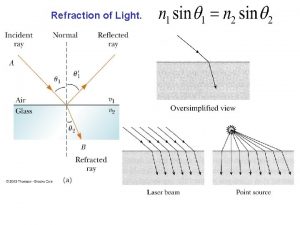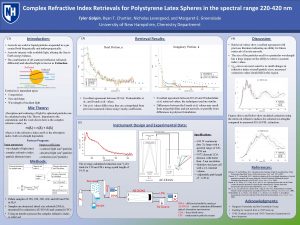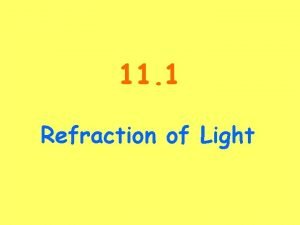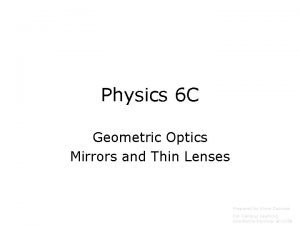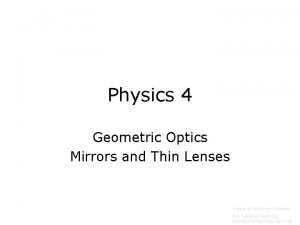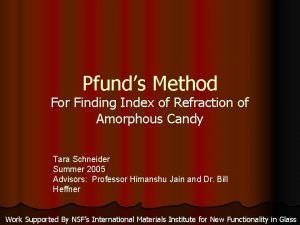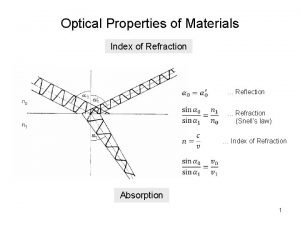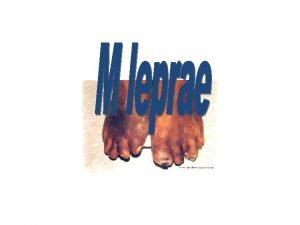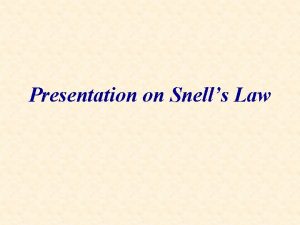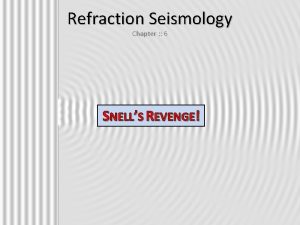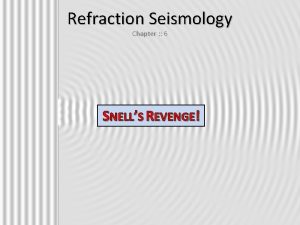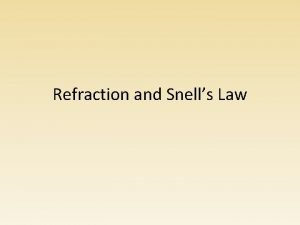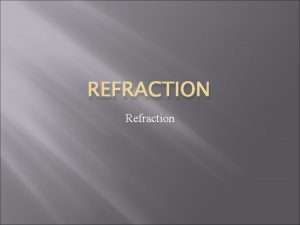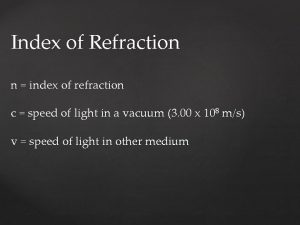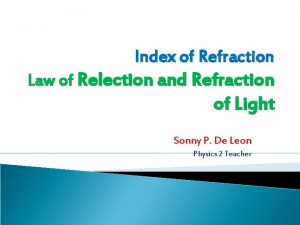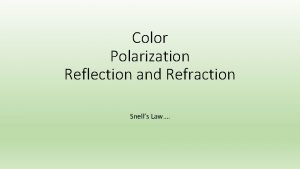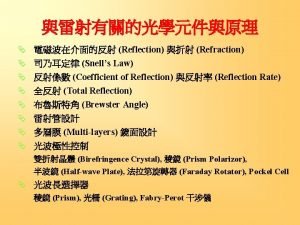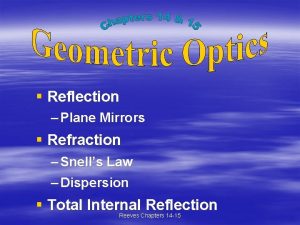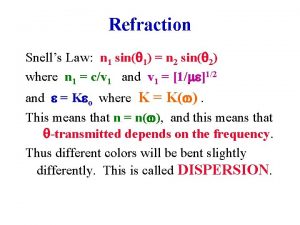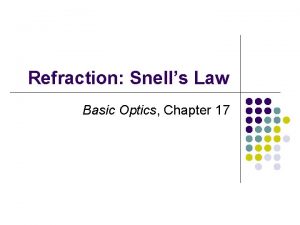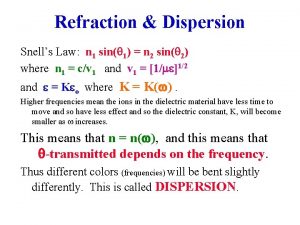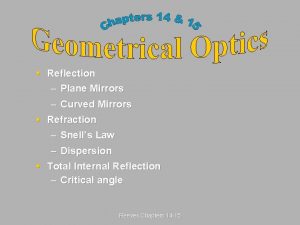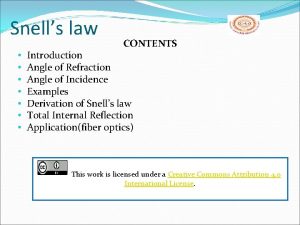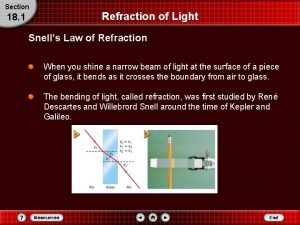Refraction and Snells Law SNC 2 D Index


























- Slides: 26

Refraction and Snells Law SNC 2 D

Index of Refraction Light will travel more slowly in more dense materials. The ratio of the speed of light in a vacuum (or air) to the speed in the material is the index of refraction (or refractive index), n.

Analogy for Refraction 3 x 108 m/s Pavement Air Glass 2 x 108 m/s vs < v p Sand 3 x 108 m/s Light bends into glass then returns along original path much as a rolling axle would when encountering a strip of mud.

Index of Refraction: Example For water, the index of refraction is 1. 33. The speed of light in water is therefore:

Index of Refraction: Example For water, the index of refraction is 1. 33. The speed of light in water is therefore:

Index of Refraction: Example For water, the index of refraction is 1. 33. The speed of light in water is therefore:

Boundaries So in 2 D (with the boundary at an angle to the wave), the wave will bend as those parts that enter the more-dense material first slow down first. (The black lines show the crests or “wavefronts”).

Please Note! If the ray is perpendicular to the boundary, no bending will occur:

Snell’s Law The amount by which the wave is bent is given by Snell’s Law (ni and nr are the refractive indices of the media).

Snell’s Law Note that a ray will always bend towards the normal when travelling into a more-dense medium

Snell’s Law Note that a ray will always bend towards the normal when travelling into a more-dense medium (and away from the normal when travelling into a less-dense medium).

Problem Solving with Snell’s Law When light passes from air into water at an angle of 45 o from the normal, what is the angle of refraction in the water?

Problem Solving with Snell’s Law When light passes from air into water at an angle of 45 o from the normal, what is the angle of refraction in the water?

Problem Solving with Snell’s Law When light passes from air into water at an angle of 45 o from the normal, what is the angle of refraction in the water?

Problem Solving with Snell’s Law When light passes from air into water at an angle of 45 o from the normal, what is the angle of refraction in the water?

Problem Solving with Snell’s Law When light passes from air into water at an angle of 45 o from the normal, what is the angle of refraction in the water?

Problem Solving with Snell’s Law When light passes from air into water at an angle of 45 o from the normal, what is the angle of refraction in the water?

Question-12 In traveling from air into water (n = 1. 33), a ray of light makes an angle of incidence of 52 o. Calculate the angle of refraction. Click

Question-11 A ray of light enters water at an angle of incidence of 30 o. The angle of refraction is found to be 22 o. Calculate the index of refraction for water. Click

Question-13 In traveling from water into air, a ray of light makes an angle of refraction of 59 o. Calculate the angle of incidence. Click

Question-14 A ray of light emerges from water into air with an angle of incidence of 22 o. What is the angle of refraction? Click

Question-16 A light ray passes through two liquids, one floating on top of the other, in a beaker. The angle of refraction in the water is 25 o (see diagram). Determine the angle of incidence (Ao). Click

n n Links http: //www. rpi. edu/dept/phys/Sc. IT/Infor mation. Transfer/reflrefr/rr_sample/rrsampl e_15. html

Dispersion Note that since different wavelengths of white light refract slightly differently, refraction can split white light into its different wavelengths (i. e. colours) especially if refracted twice.

Dispersion Note that since different wavelengths of white light refract slightly differently, refraction can split white light into its different wavelengths (i. e. colours) especially if refracted twice.

Dispersion Note that since different wavelengths of white light refract slightly differently, refraction can split white light into its different wavelengths (i. e. colours) especially if refracted twice. This is called dispersion.
 Law of optics
Law of optics Index of refraction snell's law
Index of refraction snell's law Collage about the different atmospheric optics events
Collage about the different atmospheric optics events Snell's law
Snell's law Hpps symbols
Hpps symbols Snc y snp diferencias
Snc y snp diferencias Snc-1
Snc-1 Snc lajaa venissieux
Snc lajaa venissieux Società in nome collettivo
Società in nome collettivo Síndrome de pfeiffer tipo 2
Síndrome de pfeiffer tipo 2 Snc database
Snc database Relative index of refraction
Relative index of refraction What is bending of light
What is bending of light Index of refraction of jello
Index of refraction of jello Index of refraction of jello
Index of refraction of jello Polystyrene index of refraction
Polystyrene index of refraction Speed of light in quartz
Speed of light in quartz Concaver
Concaver Index of refraction sample problems
Index of refraction sample problems Index of refraction of corn syrup
Index of refraction of corn syrup Reflection absorption
Reflection absorption Newton's first law and second law and third law
Newton's first law and second law and third law Newton's first law of motion
Newton's first law of motion Optical fibre
Optical fibre Eryhtema nodosum
Eryhtema nodosum Pqli advantages and disadvantages
Pqli advantages and disadvantages Optical fiber waveguide
Optical fiber waveguide

